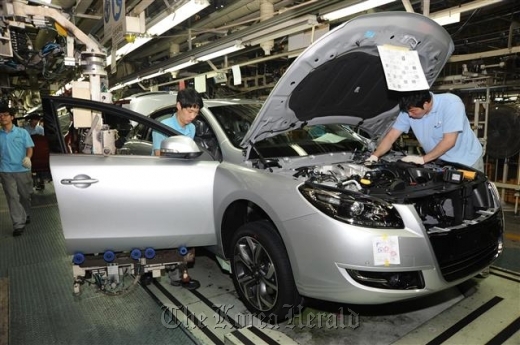Renault Samsung accepts voluntary retirement from 14% of workers
Restructuring and downsizing are sweeping the foreign business community in Korea following lackluster sales amid the global economic slowdown stemming from the financial crisis in Europe.
Korean equities continue to receive increasing attention from foreigners whose large investment, could lead to further volatility in the stock market when the global economy faces another tumble.
These market trends show an overall picture of the light and dark sides of foreign investment activity in the country, analysts said.
GM Korea and Renault Samsung, two redundancy foreign-invested automakers, are downsizing by early voluntary redundancy, which could put hundreds out of work.
Renault, a French-Korean sedan manufacturer, has been implementing such a program as it faces another year of losses this year due to “low sales,” while GM Korea, formerly GM Daewoo, claimed that its reasons for voluntary redundancy is not the same as Renault.
Restructuring and downsizing are sweeping the foreign business community in Korea following lackluster sales amid the global economic slowdown stemming from the financial crisis in Europe.
Korean equities continue to receive increasing attention from foreigners whose large investment, could lead to further volatility in the stock market when the global economy faces another tumble.
These market trends show an overall picture of the light and dark sides of foreign investment activity in the country, analysts said.
GM Korea and Renault Samsung, two redundancy foreign-invested automakers, are downsizing by early voluntary redundancy, which could put hundreds out of work.
Renault, a French-Korean sedan manufacturer, has been implementing such a program as it faces another year of losses this year due to “low sales,” while GM Korea, formerly GM Daewoo, claimed that its reasons for voluntary redundancy is not the same as Renault.

“GM is pursuing this from executives who have a few years left from retirement, not because the company is going through difficulties like Renault,” said a GM spokesman.
Its voluntary retirement is part of its regularly implemented program aimed at “energizing the company with younger employees,” he added.
The company’s first-quarter domestic sales increased 6 percent, but saw its sales at home and abroad decrease 1 percent to 409,150 units in the first half of this year, from 413,537 units a year ago.
The spokesperson said the 1 percent decrease is “very small,” although the company expects a slowdown in the automobile market in the second half for all auto manufacturers, including Hyundai and Kia.
Renault’s restructuring and cost-cutting efforts come as it continues to operate in the red from last year when it had a more than 200 billion won ($177.2 million) loss.
Its spokesperson said that this was due to increased competition from import automobiles in Korea and a slowdown in Europe.
Also, Renault Samsung was only able to introduce a new sedan “SM7” last year that did not garner enough attention, further troubling the company, he noted.
It only sold 83,062 units between January and July this year, down more than 30 percent a year ago.
The foreign financial community is facing a similar situation with many securities firms and investment banks letting their high-paid analysts go.
Nine out of 20 foreign securities firms have been downsizing their research departments since early this year, according to the Korea Financial Investment Association, an interest body for the investment banking industry.
RBS, BNP Paribas, Daiwa, CLSA and Citigroup Global Markets have reduced their staff by 20 to 30 percent, according to media reports.
In spite of this, Korean stocks continue to draw attention from foreign investors even though volatility increases in the global stock markets.
Foreign investment in Seoul stocks recently reached an all-time high at 6.6 trillion won, accounting for 31 percent of total stock market capitalization.
Hedge funds from the U.K., and currency carry trade and mutual funds from other parts of Europe as well as Asia have been boosting their investment in Korean equities as the country is still perceived to have solid fundamentals, according to S.W. Noh, an analyst at Dongbu Securities.
Also, Europe’s recent policy aimed at reinvigorating its economy has helped ease concern and revive sentiment toward emerging markets and export-led countries such as Korea.
Korea’s recent credit rating upgrades by Moody’s and Fitch will likely lead to increasing investment in Korean stocks and bonds.
“Strong fiscal fundamentals, a high degree of economic resilience and competitiveness, reduced external vulnerability of the banking sector, and continuation of status-quo in North-South geopolitics” were reasons for Moody’s upgrade, the rating agency said in a statement.
“Korea’s economic growth rate this year is slowing with the downturn in global growth, but the competitiveness of its export sector will help lead a rebound as the global economy recovers,” it added.
However, analysts warned that credit upgrades and an increase in stock investment by foreigners are not entirely a “silver lining” against the backdrop of corporate downsizing for Korea.
Foreign funds in Korea mostly consist of hot money that only seeks short-term gains, and their share of more than 30 percent of market capitalization could further increase volatility in a market that is exposed to external shocks given that Korea is heavily dependent on export for growth.
Economists said that credit rating upgrades only reflect part of Korea’s economy and do not consider other risk factors such as rising household debt.
By Park Hyong-ki (hkp@heraldcorp.com)





![[Graphic News] Number of coffee franchises in S. Korea rises 13%](http://res.heraldm.com/phpwas/restmb_idxmake.php?idx=644&simg=/content/image/2024/05/02/20240502050817_0.gif&u=)



![[Robert J. Fouser] AI changes rationale for learning languages](http://res.heraldm.com/phpwas/restmb_idxmake.php?idx=644&simg=/content/image/2024/05/02/20240502050811_0.jpg&u=)
![[Today’s K-pop] Stray Kids go gold in US with ‘Maniac’](http://res.heraldm.com/phpwas/restmb_idxmake.php?idx=644&simg=/content/image/2024/05/02/20240502050771_0.jpg&u=)






![[Eye Interview] 'If you live to 100, you might as well be happy,' says 88-year-old bestselling essayist](http://res.heraldm.com/phpwas/restmb_idxmake.php?idx=652&simg=/content/image/2024/05/03/20240503050674_0.jpg&u=)
